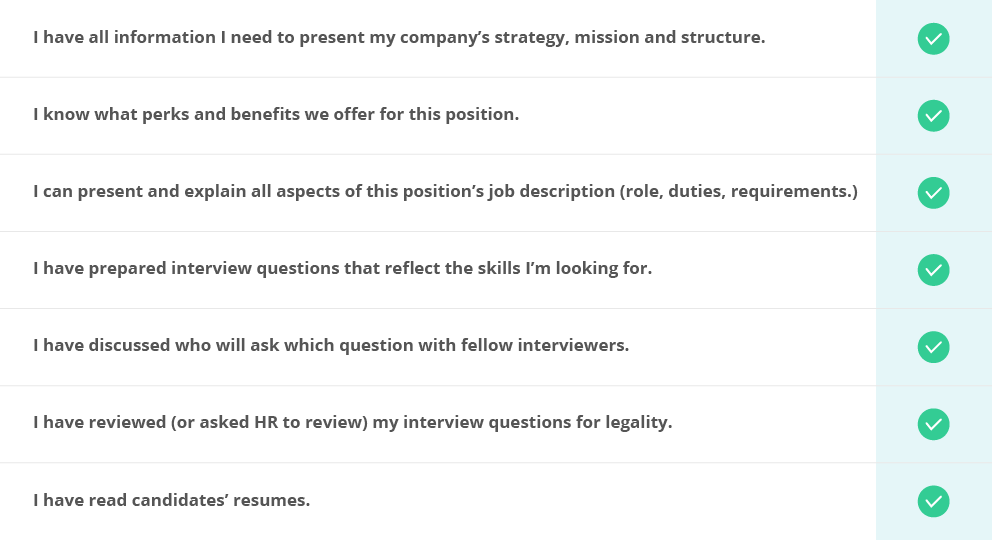
Conducting an interview involves preparation, crafting effective questions, experimenting with different formats, practicing your pitch, combating bias, and seeking advice. It's a process that requires careful planning, clear communication, and a focus on job-related characteristics to ensure a fair and effective evaluation of candidates.

Nikoletta holds an MSc in HR management and has written extensively about all things HR and recruiting.

Learning how to conduct an interview effectively can be challenging, but hiring the best candidate is a worthwhile reward.
Use this guide and interview checklist for employers to improve your interviewing skills:
Modify and use this checklist to help you prepare for an interview:

It’s a good idea to set aside some time before and after interviews. That way, you can comfortably welcome candidates and avoid having to rush them out at the end of their interviews.
A big part of your interview preparation is deciding what questions to ask candidates. You can find many interview questions sorted by job and type on online libraries. Here are some tips to assess candidates effectively:
Easily collaborate with hiring teams to evaluate applicants, gather fair and consistent feedback, check for unconscious bias, and decide who’s the best fit, all in one system.
Unstructured interviews that flow like friendly conversations make the process pleasant for both candidates and interviewers. But, they aren’t the most effective way to hire the best candidate.
Structured interviews are better predictors of job performance, more legally defensible and better for record-keeping. During structured interviews, you ask the same questions to all candidates in a specific order and score them with a predetermined rating scale. Your Applicant Tracking System may have built-in checklists or interview scorecards to help you rate candidates this way.
Both interviewers and candidates are evaluating each other during interviews. While you assess whether candidates are right for the job, candidates try to determine whether they want to work for you. If they’re not convinced, they might end up rejecting your job offer.
Prepare a checklist to sell your company and the position you’re hiring for. You could include:
Also, listen to what candidates indicate they look for in a job to personalize your pitch.
We are all prone to cognitive biases. Just decades ago, those who interviewed musicians to join orchestras were unwittingly making biased hiring decisions, resulting in almost all-male orchestras. They hired more women when they started using blind hiring methods.
Here’s how to fight bias in your interviewing process:
Hiring doesn’t have to be a lonesome road. Recruiters can be great allies when learning how to conduct an interview. Ask for their advice when you want to:
Recruiters can also help you preserve an interview’s legality. For example, it’s illegal to ask an interviewee whether they plan to have children, even if your goal is to make small talk. A good recruiter will advise against asking that question.
Improving your interviewing skills takes time, but the payoff is worth it. Effective interviews bring you one step closer to hiring the right people to reinforce your team.
How do recruiters start interviews? Recruiters start interviews by introducing themselves and any panel members, explaining their roles, offering the candidate water, and establishing rapport. They also provide a high-level overview of the interview process and the job. What should the interviewer keep in mind while conducting an interview? Interviewers should set the stage with the candidate and review the job together. They should start with generalized questions to build rapport and ask consistent questions to compare candidates equally. What are four things to keep in mind to create a positive first impression in an interview? Interviewers should be on time, present themselves appropriately, be genuine, and have a winning smile. They should also be open and confident, use small talk, be positive, and be courteous and attentive. How can interviewers combat bias in the interviewing process? Interviewers can combat bias by learning more about how biases work, identifying their own biases, learning to discard irrelevant information, slowing down their decision making, focusing on job-related characteristics, and resisting hiring in their own image. How can recruiters help interviewers improve their interviewing skills? Recruiters can help interviewers improve their interviewing skills by providing advice on developing an employer interviewing checklist, building rapport with candidates, reviewing interview questions, giving interview feedback to rejected candidates, conducting mock interviews, and arranging official training courses.
Easily build pipelines, equip your hiring team with the right tools, and produce objective evaluations.